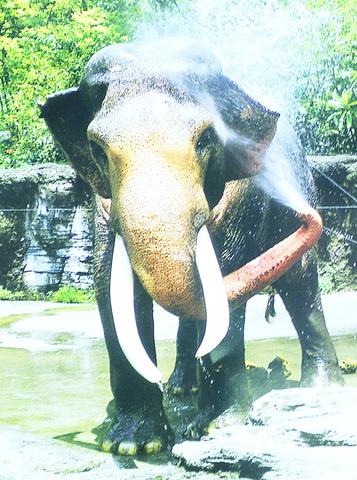Lin Wang (林旺), Taipei City Zoo's star elephant, decorated World War II veteran and the world's oldest Asian elephant in captivity, died early yesterday morning at the zoo at the grand old age of 86.
"Lin Wang was found dead by his pool at 2:30am yesterday. He died with dignity from extreme weakness due to old age," said Lin Hua-ching (林華慶), a city zoo section chief.
An autopsy later determined that he died from cardiopulmonary failure.

PHOTO: REUTERS
Lin Wang showed signs of frailty after the Lunar New Year holiday early this month, moving slowly and eating less.
The zookeeper said the elephant had been observed spending unusually long periods of time in the pool by his enclosure, known as the White House, since last Friday.
"Though we knew his health was deteriorating, we're still surprised that he has died so soon. But we take solace from the dignified way in which he died -- the fact that he didn't experience a lot of pain," Lin said.
The zoo plans to have the body of the pachyderm stuffed and displayed at the zoo, together with a reconstruction of his skeleton, an undertaking that will require around NT$5 million.
"We hope local businesses will donate the necessary funds for the project," Lin said.
The octogenarian had lived in Taiwan for more than five decades. Known as "Granddaddy Lin Wang," the elephant was an icon to many Taiwanese, young and old.
President Chen Shui-bian (陳水扁) yesterday sent wreathes to the zoo yesterday, bearing the inscription, "For Lin Wang, a friend forever."
Taipei City Mayor Ma Ying-jeou (馬英九) said: "The average life expectancy of Asian elephants is 50 years. Lin Wang had exceeded that period by so long that he had become an icon to four generations of people in Taiwan. When I was a child, my parents took me to see Lin Wang at the zoo. When I became a father, I took my daughters to see him. We watched him grow old, but he also accompanied us as we grew up."
Ma said the city government had originally planned to allow the nation's students and children to visit the zoo for free to wish the elephant well for three days starting Friday, knowing that he was weakening.
The activity will still proceed as planned, but for the purposes of conveying condolences.
"We didn't expect him to die so soon. But the activity will go ahead as scheduled," Ma said.
Lin Wang's extraordinary story began in 1943 when the ROC military acquired the elephant from Japanese prisoners of war in Burma during World War II. At the time, Lin Wang was about 26 years old.
He was used for carrying military supplies during the war and was honored later for his contributions to the war effort.
In 1947, he was transported to Kaohsiung and was transferred to Taipei City Zoo in 1954, where he lived with his long-term companion Malan.
Malan died last October at the age of 54 due to a malignant tumor on her foot.

NATIONAL SECURITY THREAT: An official said that Guan Guan’s comments had gone beyond the threshold of free speech, as she advocated for the destruction of the ROC China-born media influencer Guan Guan’s (關關) residency permit has been revoked for repeatedly posting pro-China content that threatens national security, the National Immigration Agency said yesterday. Guan Guan has said many controversial things in her videos posted to Douyin (抖音), including “the red flag will soon be painted all over Taiwan” and “Taiwan is an inseparable part of China,” while expressing hope for expedited “reunification.” The agency received multiple reports alleging that Guan Guan had advocated for armed reunification last year. After investigating, the agency last month issued a notice requiring her to appear and account for her actions. Guan Guan appeared as required,

A strong cold air mass is expected to arrive tonight, bringing a change in weather and a drop in temperature, the Central Weather Administration (CWA) said. The coldest time would be early on Thursday morning, with temperatures in some areas dipping as low as 8°C, it said. Daytime highs yesterday were 22°C to 24°C in northern and eastern Taiwan, and about 25°C to 28°C in the central and southern regions, it said. However, nighttime lows would dip to about 15°C to 16°C in central and northern Taiwan as well as the northeast, and 17°C to 19°C elsewhere, it said. Tropical Storm Nokaen, currently

‘NATO-PLUS’: ‘Our strategic partners in the Indo-Pacific are facing increasing aggression by the Chinese Communist Party,’ US Representative Rob Wittman said The US House of Representatives on Monday released its version of the Consolidated Appropriations Act, which includes US$1.15 billion to support security cooperation with Taiwan. The omnibus act, covering US$1.2 trillion of spending, allocates US$1 billion for the Taiwan Security Cooperation Initiative, as well as US$150 million for the replacement of defense articles and reimbursement of defense services provided to Taiwan. The fund allocations were based on the US National Defense Authorization Act for fiscal 2026 that was passed by the US Congress last month and authorized up to US$1 billion to the US Defense Security Cooperation Agency in support of the

PAPERS, PLEASE: The gang exploited the high value of the passports, selling them at inflated prices to Chinese buyers, who would treat them as ‘invisibility cloaks’ The Yilan District Court has handed four members of a syndicate prison terms ranging from one year and two months to two years and two months for their involvement in a scheme to purchase Taiwanese passports and resell them abroad at a massive markup. A Chinese human smuggling syndicate purchased Taiwanese passports through local criminal networks, exploiting the passports’ visa-free travel privileges to turn a profit of more than 20 times the original price, the court said. Such criminal organizations enable people to impersonate Taiwanese when entering and exiting Taiwan and other countries, undermining social order and the credibility of the nation’s